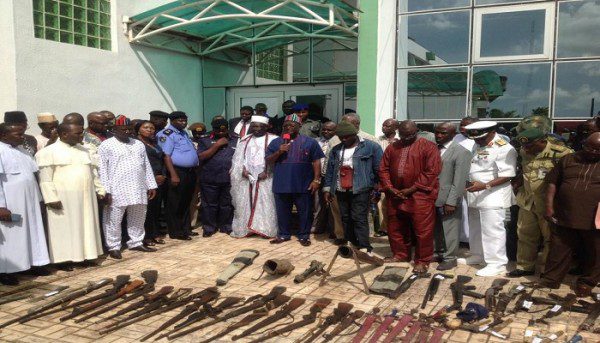National Issues
Reprieve for the Amnesty Programme -By Chukwudi Enekwechi


Bearing in mind the volatile nature of the Niger Delta region, President Muhammadu Buhari’s administration has started toeing a new path to address its myriad of problems. To enable the Amnesty programme achieve its set goals and objectives, which include rehabilitating ex-militants and integrating them into the society, the administration has departed from the old and malfunctioned ways.
Prior to President Buhari’s assumption of office, the handling of the Amnesty Programme was in staccato form, and largely driven on the basis of rent-seeking. The programme was used to patronise individuals and some groups of people without the creation of proper structures that would enable the intended participants to maximally benefit from it. Under President Buhari, the Amnesty office under Brigadier-General Paul Boroh is redrawing the map to make the programme more results-oriented.
For example, while under the previous arrangement, ex-agitators were made to receive N65,000 as monthly allowance, without providing for an exit plan, however the Buhari administration has structured it in a way that participants exit in phases, and with assured job offers. This way, the programme will make meaningful impact on the participants and the society in general.
There is need to reiterate the fact that ab-initio the Amnesty Programme had a terminal date, and so far the 30,000 ex-agitators in the programme are being well catered for.
Furthermore, the Amnesty Programme under Brig-Gen Paul Boroh has, in a bid to make the scheme more coordinated, opened offices in all Nigerian embassies and missions abroad. This has made it possible for those studying abroad to have channels of communication, rather than resorting to street demonstrations whenever they have issues with their school fees, feeding allowances and associated needs.
This approach will, in no small measure, ameliorate the problems being experienced by the ex-agitators training abroad, as well as save Nigeria the constant embarrassment and nuisance which such public demonstrations pose to our country.
Already about sixty percent of ex-agitators in various universities and other higher institutions have graduated and by December 2017, all of them would have graduated. As earlier pointed out, the Programme is drawing to an end, and from all indications, the Buhari administration may likely review or extend it. If they graciously do this, then a window of opportunity would have been opened for more Niger Delta youths who have been struggling to get a space on the programme.
Lest we forget, the Amnesty Programme was started under the administration of late President Umaru Musa Yar’Adua, on August 6th, 2009, as a means of restoring calm and peace to the restive Niger Delta region.
As lofty as the plan was, the tardiness in its implementation led to complaints from certain quarters that the Buhari administration has abandoned it. But in realisation of the key role the programme can play in stabilising the Niger Delta region, which will ultimately lead to development, the Buhari administration has repositioned it, and is presently partnering with some international agencies, multilateral organisations and countries, such as the UK, EU, UNDP, the World Bank, Japan and others.
Taking into consideration the strategic importance of the Amnesty Programme, President Buhari had within two months of being sworn into office not only appointed the above mentioned Presidential Adviser Brig-Gen Paul Boroh, but also resumed the payment of allowances to ex-militants, while settling outstanding payments for overseas students under the programme.
It is on record that 103 of the students studying in the United Kingdom have already graduated with honours, from 17 universities. Many of them have also graduated from universities at home, including 200 from the Benson Idahosa University, Benin City.
The historical trajectory I have toed is aimed at putting on record the total commitment of President Muhammadu Buhari in ensuring that the Amnesty Programme is successful, and to the greater benefit of the people of Niger Delta and Nigeria as a whole.
It is in the interest of all stakeholders, especially the youths of the region to join hands with the Buhari administration in seeing to the successful implementation of the Amnesty Programme and the overall development of the region.
It is important to point out that President Muhammadu Buhari is a well-meaning leader, and for him to succeed in delivering democracy dividends to all Nigerians, there is need for all and sundry to give him maximum support and cooperation.
But beyond government efforts, international oil companies, states and local governments ought to play their roles in bringing development to the region. For example, there is no justification for oil companies to continue to work and live in opulence, while neglecting the oil-bearing communities. It is only reasonable that basic amenities such as water, electricity, food, roads, schools and hospitals should be provided to their host and other local communities; and this approach would definitely boost the relationship between them.
The state and local governments on their part can contribute to peace and amity in the region by applying resources to critical areas of need for the people. A situation where the people of the oil-bearing communities are denied basic amenities by their local and state governments is unacceptable.
Already, the Federal Government is using different interventionist programmes to uplift the lives of the people of Niger Delta and other stakeholders must contribute their quota for a meaningful impact to be achieved.
Chukwudi Enekwechi is an Abuja-based Public Affairs Analyst and can be reached via kwechis19@yahoo.com



















